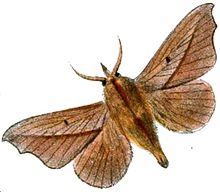
The solitary sandpiper is a small shorebird. The genus name Tringa is the Neo-Latin name given to the green sandpiper by Aldrovandus in 1599 based on Ancient Greek trungas, a thrush-sized, white-rumped, tail-bobbing wading bird mentioned by Aristotle. The specific solitaria is Latin for "solitary" from solus, "alone".
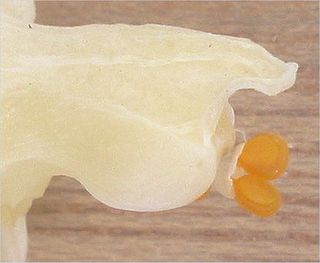
A pollinium is a coherent mass of pollen grains in a plant that are the product of only one anther, but are transferred, during pollination, as a single unit. This is regularly seen in plants such as orchids and many species of milkweeds (Asclepiadoideae). Usage of the term differs: in some orchids two masses of pollen are well attached to one another, but in other orchids there are two halves each of which is sometimes referred to as a pollinium.

The stripe-breasted spinetail is a passerine bird in the Furnariinae subfamily of the ovenbird family Furnariidae. It is found in Colombia, Trinidad, Tobago, and Venezuela.
The Wanda Mountains are located in the Heilongjiang Province of China.

Osmundastrum is genus of leptosporangiate ferns in the family Osmundaceae with one living species, Osmundastrum cinnamomeum, the cinnamon fern. It is native to the Americas and eastern Asia, growing in swamps, bogs and moist woodlands.

The cinnamon neopipo or cinnamon manakin-tyrant is a species of bird in the family Tyrannidae. It is the only member of the genus Neopipo.
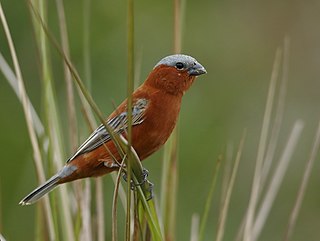
The chestnut seedeater is a species of bird in the family Thraupidae. It is found in Argentina, Brazil, Paraguay, and Uruguay.

The rufous paradise flycatcher is a species of bird in the family Monarchidae. It is found in Indonesia and the Philippines. Its natural habitat is subtropical or tropical moist lowland forests.

Rosa majalis is a species of deciduous shrubs in the genus Rosa, native to forests of Europe and Siberia. It grows to 2 m. and yields edible hip fruits rich in vitamin C, which are used in medicine and to produce rose hip syrup.

Metalampra italica is a moth of the family Oecophoridae that was until recently considered endemic to Italy, from which it was originally described in 1977 by Baldizonne, but that is now also known to occur in other European countries.
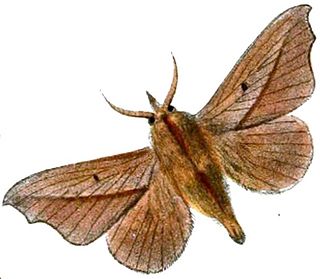
Bharetta is a genus of moths in the family Lasiocampidae. The genus was erected by Moore in 1866.

Phragmataecia cinnamomea is a species of moth of the family Cossidae. It is found in Taiwan and southern China.

Taiwanofungus camphoratus, also known as stout camphor fungus, is a species of fungus that is endemic to Taiwan, where it grows only on the endemic aromatic tree Cinnamomum kanehirae, causing a brown heart rot.
Euphaedra cinnamomea is a butterfly in the family Nymphalidae. It is found in the Democratic Republic of the Congo.
Nikolai Aleksandrovich Krasilnikov was a Soviet microbiologist, bacteriologist and soil scientist.
Krasilnikovia cinnamomea is a bacterium species in the genus Krasilnikovia.

Panopsis is a genus of trees in the family Proteaceae. The species, which occur in Central and South America, include: Newer species that can be considered part of the Panopsis genus has been discovered recently, called Panopsis magnifruta. Common areas where Panopsis species are seen to grow in are described to have elevated groundwater levels.
Gravitcornutia cinnamomea is a species of moth of the family Tortricidae. It is found in Brazil in the states of Santa Catarina and São Paulo.
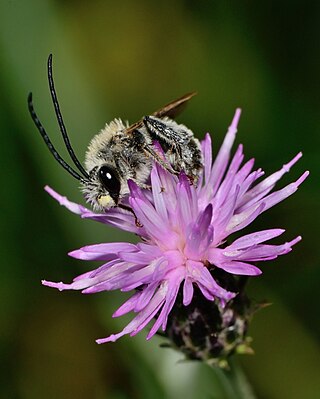
Eucera cinnamomea is a bee in the family Apidae and the subfamily Apinae.
Cheilanthes cinnamomea is a species name, which may refer to:
